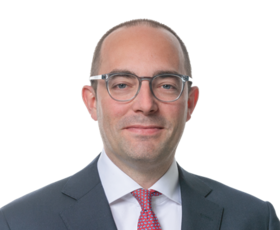



Market review
Equity markets continued to recover in May from the tariff-induced selloff the prior month, notwithstanding the erratic nature of policy announcements, as trade tensions eased. Led by US technology shares the MSCI All Country World Index rose by 4.9%, with financials – as per the Trust’s benchmark, the MSCI All Country World Financials Index – marginally lagging the wider equity market with a return of 4.5%, albeit with European and Japanese financials leading the sector as interest rate expectations hardened. Unsurprisingly with equity markets risk-on, banks, consumer finance stocks and asset managers saw the strongest gains while insurance stocks lagged the rally. Against this background, the Trust’s net asset value rose 5.2% with holdings in Alpha Bank, Interactive Brokers Group and Plus500 seeing the strongest gains. Conversely Swiss Re, Globe Life and Fidelity National Information Services all fell slightly over the month.
Berkshire Hathaway
Berkshire Hathaway held its AGM in May, as usual, with thousands of attendees flocking to Omaha to hear Warren Buffett’s latest thoughts. The shares fell following the surprise announcement that he would be stepping down as CEO to be replaced by Greg Abel, although results were also weaker than expected due to the cost of the Californian wildfires on its reinsurance business. Not surprisingly, this garnered significant coverage even though Buffett had admitted last year that he had already stepped away from the day-to-day management of the business. With cash and T-bills rising to a record US$350bn, Berkshire Hathaway remains incredibly well positioned should the tide flow out, but we see little change to the business with Buffett remaining as Chairman and likely to advise on any large investment decisions. In fact, the huge size of Berkshire Hathaway’s balance sheet at over $1trn of assets makes the company a supertanker and it is very hard to put that amount of money to work, as Buffett has repeated on several occasions.
Trading platforms
Trading platforms have been very strong in 2025 benefiting from the continued growth in retail trading and a pick-up in volatility. The listing of eToro*, a European retail platform, in the US, at a significant premium to its European listed peers, highlighted the value and the opportunity set across the subsector. Oliver Wyman estimates that Europe will add 22 million new brokerage accounts by 2028, with penetration of the adult population increasing from 6.8% to 11.7% over the same timeframe, although still less than one third of that in the US. Younger generations are also starting to invest at an earlier age, with generation Z starting on average at age 19 versus 26 for millennials and 32 for generation X, reflecting the ease and great user experience due to technology available on mobile apps and ability to learn about trading and investing. The business models and fragmentation of European markets have led us to hold a diverse range of companies including FinecoBank, FlatexDEGIRO, IG Group Holdings and Plus500, and this group remains one of the largest positions in the portfolio.
Alternative asset managers
With the continued slow background for M&A activity, alternative asset managers have seen pressure on earnings due to the backlog of companies they need to sell to return capital to their investors. Nevertheless, while 2024 has seen a further fall in fundraising it is still positive, in contrast to their traditional asset management peers who lack exposure to ETFs. Ares Management and Intermediate Capital Group (ICG) announced results and both saw assets under management grow by mid-teens percentage points. Notwithstanding negative press, management teams remain very positive on the long-term opportunity, with Michael Arougheti, CEO of Ares Management, on the company’s earnings call, stating that “we are still in the very early innings” when looking at the demand for private credit. Also, in a meeting we had with the CFO of Carlyle Group, he argued that the opportunity in wealth management is “such an enormous opportunity for the industry” which will take more than 10 years to play out.
CFO of Carlyle Group, argued that the opportunity in wealth management is “such an enormous opportunity for the industry” which will take more than 10 years to play out.
European financials
In contrast, the European banking sector has stood out for the pick-up in M&A activity which has benefited performance along with further positive earnings revisions. Erste Group, an Austrian bank with operations in central and eastern Europe, announced it was buying a 49% stake in Santander Polska* for €6.9bn and while there was speculation about the ability of UniCredit to execute on its acquisition of Banco BPM*, even though it has appealed the restrictions put in place by the Italian government for its approval, it lifted its stake in Alpha Bank, a Greek bank, to just under 20% and requested permission to take it to 29.9%. The response from Greek regulators and politicians has been uniformly positive to the increase in its stake, in contrast to the reaction of politicians in Germany in relation to its stake building in Commerzbank*. This is in spite of a large part of that stake being bought off the German government which it had notified in advance of its interest.
Section 899
“The One Big Beautiful Bill Act”, the misnamed tax bill, passed through the House of Representatives during the month. As well as increasing spending in areas such as defence and extending tax cuts, it entails legislation, under section 899 of the bill, to allow the US to increase taxes on the subsidiaries of non-US companies that look to repatriate profits based in countries that impose unfair foreign taxes, such as the digital services tax that the UK and EU levy on US technology companies. If enacted as written, it could have a material impact on some companies within the sector that have sizeable US businesses, such as Barclays. However, we would expect companies impacted to be able to offset a large part of the hit to earnings if that were to happen. Nevertheless, we see it more as another trade negotiation tool. Consequently, we expect very limited, if any, impact on the sector outside the continued uncertainty that the overall economic policies of the US government have so far had on the global economy and financial markets.
Outlook
As highlighted in recent commentary, the portfolio has been tilted towards some of the more defensive parts of the sector and those likely to be beneficiaries of any continued volatility in financial markets. European banks and latterly also Indian banks are benefiting from an easing liquidity environment, where we have a more constructive view. It is worth highlighting that the sector has also been a beneficiary of its lower weighting to the US against the background of US exceptionalism being questioned and weakness in the US dollar. This is due to the sector being a significantly larger percentage of non-US equity markets, reflecting their higher domestic focus. At the end of the month, the Trust had 47.4% in US financials, around 2% lower than the benchmark and 10.6% lower than our positioning in December.
* not held





